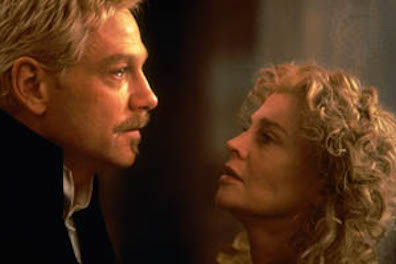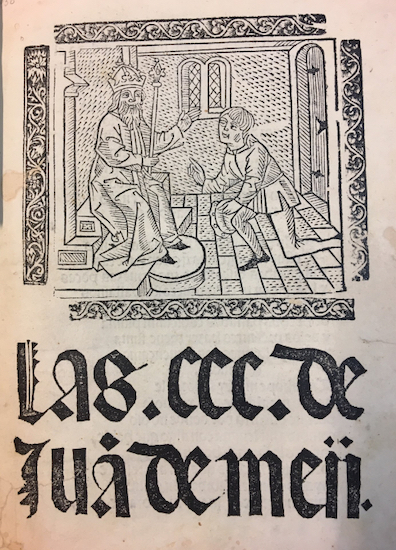The 1922 Ulysses reads "vailed," as does the Gabler
edition of the 1980s, but texts from the intervening years
have the more familiar word "veiled," which was introduced in
the Odyssey Press editions of the 1930s—one of many instances
in which attempts to correct the abundant errors in Joyce's
text have introduced new ones. The novel employs the word
"veiled" several other times, always with clear contextual
reasons, but no such reasons are apparent in this passage of Lotus
Eaters. It is somewhat feasible to imagine Bloom's eyes
being veiled by their lids, but saying that the lids
themselves are veiled yields utter nonsense.
These difficulties vanish if one restores the "vailed" of the
first edition and the Rosenbach manuscript. According to the OED,
the principal meaning of "vail" (a transitive verb that is now
"archaic") is "To lower," and "vailed" (now "obsolete") means
"Lowered, drooped; doffed or taken off in salutation." Both
words, and especially the participle, seem to have been used
steadily less often since the 17th century. But Joyce was fond
of dropping recherché words into his text: "barbacans," "filibegs," "cunnythumb," "hanched," "bretelles," "anastomosis," "sjambok." At the end of this
very sentence he will refer to "braided drums" in the completely
unfamiliar context of a woman's leather gloves.
Once one looks up the meaning of "vailed" it is easily
applied to the context: Bloom's eyes are half closed. But why
would his eyelids be lowered at this moment? One obvious
possibility is that he is shielding his eyes from the bright
morning sun: he has recently thought that it is a "Very warm
morning"—"So warm"—and as the woman rides off on her cab he
sees "the laceflare of her hat in the sun." But Bloom is
standing on the east side of the street, looking in a
generally westerly direction toward the Grosvenor Hotel.
Moreover, he is probably standing in a shadow cast by the
train station. The morning sun cannot be in his eyes.
Another possibility is that Joyce may be making some sort of
allusion to Shakespeare's Hamlet. In the most
well-known use of "vailed" in English literature, the prince's
mother says,
Good Hamlet, cast thy nighted color off,
And let thine eye look like a friend on Denmark.
Do not for ever with thy vailed lids
Seek for thy noble father in the dust.
Thou know'st 'tis common, all that lives must die,
Passing through nature to eternity.
(1.2.68-73)
These lines provide a bit more to work with. A Shakespearean
influence may be inferred from Bloom's wearing "black tie and
clothes" (a "nighted color") while displaying vailed eyelids.
But the echoes of
Hamlet do not reach very far or
establish much intertextual dialogue. Hamlet's lowered eyelids
convey grief, just as those of Venus do in
Venus and Adonis
when she learns of the death of her beloved: "Here overcome,
as one full of despair, /
She vail'd her eyelids"
(955-56). Bloom's eyes are not overcome by grief. In fact,
Charlie M'Coy has just commented on his funereal clothes and
Bloom has hastened to assure him that they are only for a casual
acquaintance, not someone near and dear. Later in the chapter he
will resent the demands on his time: "Bore this funeral affair.
O well, poor fellow, it's not his fault."
If the vailed eyelids do not result from grief, what else may
they express? At least one other reading of the phrase seems
possible. "Vail" comes from an Old French word (avaler
= to lower) which must have entered English with the Normans.
In Middle English times and well into the 17th century it was
typically used for acts of chivalric homage: lowering a
head-piece or banner to show respect. The full range of
meanings of "vail" provided in the OED include "To
lower in sign of submission or respect"; "To throw down, give
up, or surrender"; "To doff or take off (a bonnet, hat, crown,
or other head-dress), esp. out of respect or as a sign of
submission"; "To manifest submission; to acknowledge oneself
overcome or surpassed; to yield, give way"; and so forth.
Shakespeare's plays contain several uses of this kind. In Henry
VI, part 1, Joan of Arc says, "Now the time is come / That
France must vail her lofty-plumed crest / And let her
head fall into England's lap" (1.5.3). In Edward III
(a play which Shakespeare probably had a hand in writing),
Copland, who has refused to yield up a prisoner to the King,
tells him that he now "Is come to France, and with a lowly
mind / Doth vail the bonnet of his victory"
(5.1.77-78). Pericles recalls how his father "Had princes sit
like stars about his throne, / And he the sun for them to
reverence; / None that beheld him but, like lesser lights, / Did
vail their crowns to his supremacy" (2.3.39-42).
This feudal sense of abasing oneself before superior power was
the principal significance in Shakespeare's time, but the word
was also occasionally adapted to the erotic context of
surrendering oneself to love—naturally enough, given the
courtly love convention of treating the beloved as a
quasi-feudal lord. The OED cites Stanyhurst's Æneis
(1581): "Also let oure Dido vayle her hert too bedfeloe
Troian." In Endymion (1591) John Lyly writes
that it is "the fashion of the world" to "vaile bonnet to
beautie." Coryat's Crudities (1611) says, "Shee
wil very neare benumme and captivate thy senses, and make
reason vale bonnet to affection." And in an earlier
scene of Edward III, after the King has remarked on
the Countess of Salisbury's power "to draw / My subject eyes
from piercing majesty / To gaze on her with doting admiration"
(1.2.104-6), Lodwick criticizes this abasement of the royal
person: "If she did blush, 'twas tender modest shame, / Being
in the sacred presence of a king; / If he did blush, 'twas red
immodest shame, / To [vail] his eyes amiss, being a king"
(2.1.14-17).
If Joyce is using the word in this way then Bloom's
eyelids are lowered because he is infatuated, or at least
eager to seem so. Whether they are the enraptured eyes of a
helpless adorer or the bedroom eyes of a would-be seducer,
they perform an erotic signaling that is both active and
passive: boldly paying tribute to beauty while half swooning
away. This seems entirely consistent with Bloom's sexual
nature. The novel characterizes him as a husband whose warm
devotion shades over into uxoriousness, a shameless voyeur who
is nevertheless disinclined to commit adultery, a masochist
whose fantasies about being dominated by strong women are
counterbalanced by spunky independence, a grown man who
invites women's sympathy by playing the sad little boy. He has
previously abased himself before the woman at the curb by
thinking of her as a haughty specimen who would never give him
the time of day, only to indulge a fantasy of sexual domination:
"Possess her once take the starch out of her." His eyes here
say, "I am overcome," but he is the one using them to stare at
a woman who is not his wife.




